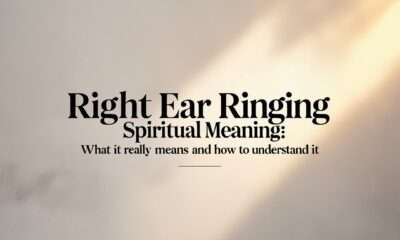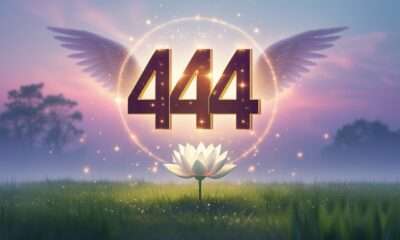Dream Meanings
7 Steps to Understanding Better Your Dreams

Dreams are a fascinating window into our subconscious mind, offering insights into our emotions, thoughts, and experiences. By understanding your dreams, you can gain valuable knowledge about yourself and your life. In this article, we will explore seven steps to help you decode and understand the messages your dreams are trying to convey.
Table of Contents
Step 1: Keep a Dream Journal
Start by keeping a dream journal. Every morning, jot down everything you remember about your dreams, no matter how fragmented or bizarre. This practice helps you recognize patterns and recurring themes in your dreams, making it easier to interpret their meanings over time. Use a dedicated notebook or a digital app designed for dream journaling. Be consistent with your journaling to see the best results.
When recording your dreams, include as much detail as possible. Note the setting, characters, emotions, and any significant events. Pay attention to colors, sounds, and even smells if they stand out. Over time, you might notice patterns or symbols that recur in your dreams, which can provide valuable clues to their meanings.
Consistency is key in dream journaling. Make it a habit to write in your journal immediately upon waking, as dream details can quickly fade from memory. By diligently recording your dreams, you’ll build a rich database of your subconscious mind’s activity, enabling you to see connections and gain deeper insights into your inner world.

Step 2: Identify Dream Symbols
Dreams often communicate through symbols. Identify key symbols in your dreams and consider their personal significance. For example, water might represent emotions, while flying could signify a desire for freedom. Understanding your unique dream symbols will provide deeper insights into your subconscious mind and help you decode your dreams more accurately.
Symbols in dreams can vary greatly in their meanings based on individual experiences and cultural backgrounds. A snake might symbolize fear for one person but transformation for another. To understand what symbols mean to you, think about your personal associations and feelings towards them.
Creating a personal dream symbol dictionary can be helpful. Whenever you identify a symbol in your dreams, jot it down in a separate section of your dream journal along with its possible meanings. Over time, you’ll develop a personalized reference guide that reflects your unique subconscious language.
Don’t rush the interpretation process. Some symbols might have multiple meanings or evolve over time as your life circumstances change. Stay open-minded and consider the broader context of your dream. By taking the time to understand your dream symbols, you can unlock deeper layers of meaning and gain valuable insights into your subconscious mind.
Step 3: Reflect on Your Waking Life
Your dreams are influenced by your waking life experiences, thoughts, and emotions. Reflect on what’s happening in your life and how it might relate to your dreams. Stress, relationships, and daily activities can all impact your dream content. By connecting your dreams to your waking life, you can uncover hidden meanings and messages.
Consider keeping a daily diary alongside your dream journal. Document your daily activities, major events, emotional states, and any significant thoughts or concerns. By comparing your dream entries with your daily diary, you might notice correlations between your dreams and your waking life.
For instance, if you dream about being chased, think about what might be causing you stress or anxiety in your daily life. Are there any situations or people that you feel pressured by? Reflecting on these connections can help you understand the underlying causes of your dreams and address them in your waking life.
Additionally, consider the timing of your dreams. Sometimes, dreams can provide insights into future events or serve as a reflection of past experiences. By understanding the link between your dreams and your waking life, you can gain a holistic view of your inner world and make informed decisions to improve your overall well-being.

Step 4: Use Dream Dictionaries Wisely
While dream dictionaries can be helpful, they should not be relied upon exclusively. These resources provide general interpretations of common symbols, but your personal associations with symbols are equally important. Use dream dictionaries as a starting point, but always consider your own feelings and experiences when interpreting your dreams.
Dream dictionaries offer a broad overview of common dream symbols and their potential meanings. They can be a useful tool for identifying general themes and gaining initial insights into your dreams. However, remember that dream symbols can be highly subjective and context-dependent.
For example, a dream dictionary might suggest that dreaming of a house represents your mind or self. But to truly understand what the house symbolizes in your dream, consider your personal connection to houses. Do you associate them with safety and comfort, or do they represent confinement and restriction?
Always trust your intuition when interpreting your dreams. If a dream dictionary’s interpretation doesn’t resonate with you, don’t force it. Instead, use it as a guide to explore different possibilities and deepen your understanding of your own subconscious language. By balancing external resources with your inner wisdom, you can develop a more accurate and meaningful interpretation of your dreams.
Step 5: Explore Your Emotions
Pay attention to the emotions you feel during your dreams. Emotions can provide important clues about the underlying messages in your dreams. For instance, feeling scared might indicate unresolved fears, while happiness could signify contentment or fulfillment. Analyzing your dream emotions will help you understand the emotional context of your dreams.
Emotions in dreams are often intensified and can reveal aspects of your subconscious mind that you might not be fully aware of in your waking life. When recording your dreams, note the emotions you experienced and their intensity. Were you terrified, joyful, anxious, or peaceful?
Understanding the emotional tone of your dreams can provide valuable insights into your inner world. For example, recurring dreams of anxiety might indicate unresolved stressors in your waking life. By addressing these stressors, you might find that the anxiety in your dreams diminishes or transforms.
Emotional analysis can also help you identify patterns in your dream life. Are there specific emotions that frequently appear in your dreams? What events or symbols trigger these emotions? By exploring these emotional patterns, you can gain a deeper understanding of your subconscious mind and work towards emotional healing and growth.

Step 6: Look for Recurring Themes
Recurring dreams or themes often highlight unresolved issues or persistent thoughts. Identify any patterns in your dreams and consider what they might be trying to tell you. Recurring dreams can be particularly revealing, as they suggest areas of your life that need attention or healing.
To identify recurring themes, review your dream journal periodically. Look for common symbols, settings, characters, or emotions that appear in multiple dreams. These recurring elements can provide clues to underlying issues that your subconscious mind is trying to bring to your attention.
For example, if you frequently dream about being lost, it might indicate feelings of confusion or uncertainty in your waking life. Reflect on areas where you might feel directionless or overwhelmed. Addressing these issues can help resolve the recurring theme and bring about a sense of clarity and purpose.
Recurring dreams can also evolve over time, reflecting your progress and growth. Pay attention to how these dreams change and what new elements are introduced. By understanding and addressing the recurring themes in your dreams, you can facilitate personal growth and work towards resolving underlying issues in your waking life.
Step 7: Seek Professional Help if Needed
If your dreams are causing distress or confusion, consider seeking help from a professional, such as a therapist or dream analyst. These experts can provide additional insights and guidance, helping you understand and process your dreams more effectively. Professional assistance can be particularly beneficial if you’re dealing with recurring nightmares or emotionally intense dreams.
Therapists and dream analysts are trained to help individuals explore the deeper meanings of their dreams and address any psychological or emotional issues that might be influencing them. They can offer a safe and supportive environment for you to discuss your dreams and gain clarity on their significance.
If you’re experiencing recurring nightmares, a professional can help you identify and work through the underlying causes. They can also teach you techniques for managing and reducing nightmares, such as lucid dreaming or imagery rehearsal therapy.
Seeking professional help is a proactive step towards understanding and improving your mental and emotional well-being. It demonstrates a commitment to your personal growth and a willingness to explore the deeper aspects of your subconscious mind. Don’t hesitate to reach out for support if you feel overwhelmed or confused by your dreams.
Conclusion
Understanding your dreams is a powerful tool for self-discovery and personal growth. By following these seven steps, you can unlock the hidden messages in your dreams and gain a deeper understanding of your subconscious mind. Embrace the journey of dream exploration and let your dreams guide you towards greater self-awareness and fulfillment.
What Does It Mean to Having a Spiritual Baby?
FAQ
Why should I keep a dream journal?
Keeping a dream journal helps you capture and analyze your dreams more effectively. By recording your dreams every morning, you can identify patterns, symbols, and recurring themes, which are essential for understanding the messages from your subconscious mind. Over time, this practice can enhance your ability to remember and interpret your dreams, providing valuable insights into your inner world.
How can I identify symbols in my dreams?
To identify symbols in your dreams, start by noting any significant objects, characters, or events that stand out. Consider your personal associations with these symbols and how they relate to your waking life. Creating a personal dream symbol dictionary can be helpful. Compare your interpretations with general meanings found in dream dictionaries, but always prioritize your own feelings and experiences for accurate analysis.
How do my waking life experiences influence my dreams?
Your dreams are often influenced by your daily experiences, thoughts, and emotions. Stress, relationships, and significant events can all impact the content of your dreams. By reflecting on your waking life and identifying connections between your experiences and your dreams, you can uncover hidden meanings and gain a deeper understanding of your subconscious mind.
Are dream dictionaries reliable for interpreting dreams?
Dream dictionaries can be a useful starting point for interpreting common symbols, but they should not be relied upon exclusively. Symbols can have unique meanings based on your personal experiences and cultural background. Use dream dictionaries as a guide, but always consider your own feelings and associations when interpreting your dreams for a more personalized understanding.
When should I seek professional help for my dreams?
Consider seeking professional help if your dreams are causing distress, confusion, or recurring nightmares. A therapist or dream analyst can provide additional insights and guidance, helping you process your dreams more effectively. Professional assistance is particularly beneficial if you’re dealing with emotionally intense dreams or struggling to interpret complex symbols on your own.
Dream Meanings
Snake in Dreams: Spiritual Meaning and Ancient Symbolism Explained
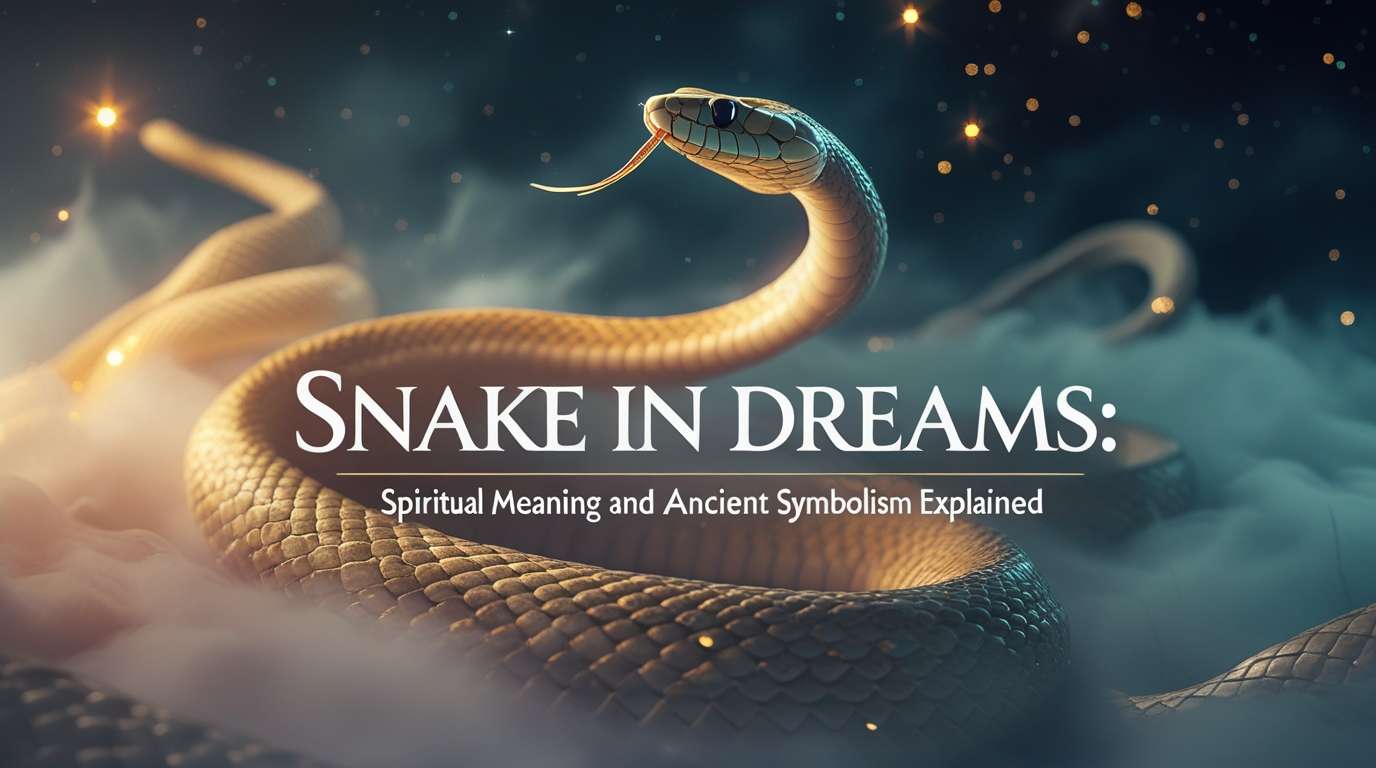
Dreams shape the way we think about ourselves and the world. They reveal symbols that carry deep meaning, and few are as powerful as the snake. When a snake in dreams appears, it is never ordinary. The image feels charged, often unsettling, and rich with symbolism. For thousands of years, snakes have represented transformation, healing, temptation, wisdom, and hidden truths.
This will explore why snakes in dreams leave such a strong impression, what spiritual traditions say about them, and how to interpret their presence in modern life.
Table of Contents
Why a Snake in Dreams Feels So Powerful
The emotional impact of a snake dream is often stronger than the details. People remember the fear, awe, or curiosity more vividly than the setting. This is because snakes are universal symbols. In nature, they are unpredictable and dangerous, and in culture, they are tied to mystery and transformation. A snake in dreams brings that energy directly into the subconscious.
For some, the image feels threatening. For others, it brings peace or renewal. Either way, the dream tends to stay with you, demanding attention and interpretation.

Spiritual Meaning of Snake in Dreams
Spiritually, snakes in dreams often carry four core messages:
- Transformation: The shedding of skin represents growth and new beginnings.
- Healing: The serpent has long been a sign of medicine, health, and recovery.
- Life energy: In Hinduism, kundalini energy is depicted as a coiled snake rising through the spine.
- Hidden truths: Snakes bring forward what is usually kept in the shadows.
These meanings show that a snake dream can be more than fear—it may signal growth or awakening.
Common Interpretations of Snake Dreams
The way the snake behaves in your dream adds meaning:
- Snake bite: A sharp wake-up call, possibly a warning about health, betrayal, or urgency.
- Snake shedding skin: Symbol of rebirth and leaving old patterns behind.
- Calm snake: Wisdom, controlled power, or peace with your instincts.
- Killing a snake: Taking back control or ending something toxic in life.
- Snake in water: Deep emotions surfacing, often feelings you’ve avoided.
- Snakes in the house: Personal or family issues needing attention.
- Multiple snakes: Overwhelm, too many pressures or conflicts.
The details matter. A snake in dreams never arrives without context.
Ancient Symbolism of Snake in Dreams
Understanding cultural history helps explain why a snake dream feels so significant.
- Egypt: The cobra represented divine protection and power.
- Greece: The staff of Asclepius with a snake symbolizes medicine and healing.
- India: Snakes are sacred, tied to fertility, wisdom, and kundalini energy.
- Abrahamic religions: The snake often represents temptation and testing.
- China: The snake zodiac sign symbolizes intuition and intelligence.
- Mesoamerica: Quetzalcoatl, the feathered serpent, embodied wisdom and creation.
Every culture gave the snake deep meaning—sometimes protective, sometimes dangerous, but never neutral.
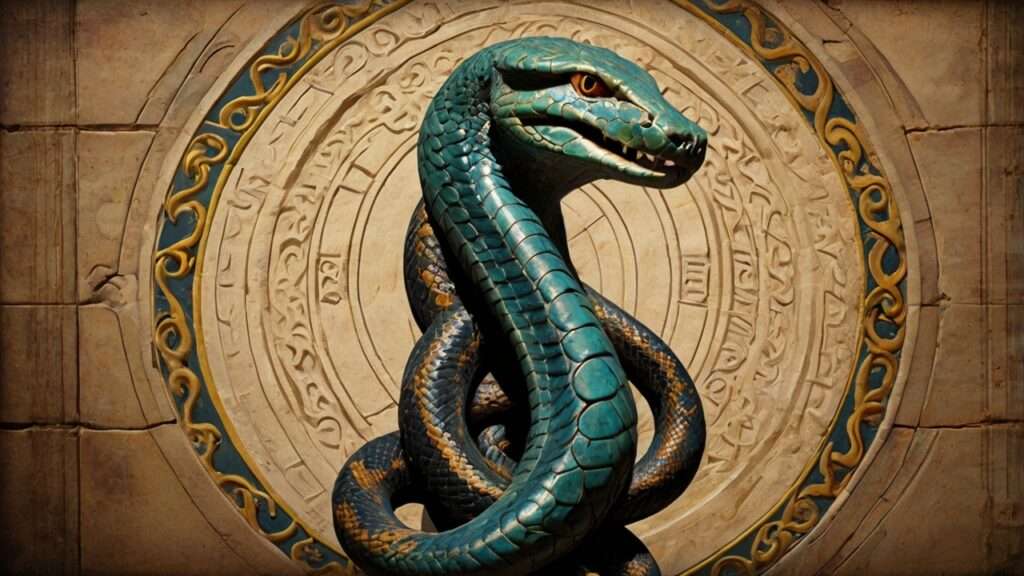
Psychological View of Snake in Dreams
Beyond spirituality, psychology offers another lens. Carl Jung described snakes as symbols of the unconscious and the shadow self. Dreaming of snakes may point to:
- Repressed fears or desires.
- Instincts you have ignored.
- Inner transformation preparing to surface.
In this way, a snake in dreams acts like a mirror, showing what is hidden inside the self.
The Importance of Emotions and Context
Two people can dream of snakes and interpret them very differently. That’s why your feelings in the dream are key.
- Fear suggests avoidance or denial.
- Calmness suggests growth or readiness.
- Relief suggests healing and acceptance.
The color of the snake adds further meaning. Black often symbolizes mystery, white signals clarity, red is tied to passion, green to healing, yellow to confidence, and blue to truth. Context—your feelings, the setting, and the action—shapes the dream’s meaning more than the symbol alone.
When Snake Dreams Repeat
Repeating snake dreams are particularly important. They suggest your subconscious is trying to deliver a message you have not yet understood. If the dream repeats with intensity, it may be warning you to act. This could involve addressing a relationship, health matter, or emotional truth you’ve ignored.
A recurring snake in dreams is not random—it’s persistent.

How to Interpret Your Own Snake Dream
To work with your dream, begin by recording it as soon as you wake. Write down details such as the color, setting, and your feelings. Then ask direct questions:
- What am I avoiding?
- What needs to change in my life?
- What part of me is ready for renewal?
This practice turns the dream into a guide. Snakes in dreams may seem threatening, but they are often invitations to grow.
Why a Snake in Dreams is a Sign of Growth
Despite fear, snakes in dreams often point toward progress. Transformation, healing, and awakening are at the heart of their symbolism. Even when the dream feels negative, it may be pushing you to confront what is necessary for growth. A snake dream does not simply warn—it challenges and encourages.
Conclusion
A snake in dreams is one of the most enduring and meaningful dream symbols. Across time and culture, snakes have represented transformation, healing, temptation, wisdom, and spiritual energy. When a snake appears in your dream, it is a call to pay attention.
The meaning depends on context: how you felt, where the snake appeared, and what it did. Sometimes it signals growth, sometimes a warning, and sometimes deep healing.
What remains constant is this: the snake is never meaningless. It is a powerful messenger, urging you to reflect, to face fears, and to embrace the changes unfolding in your life.
Awaken Your Spiritual Intuition NOW: Decode Divine Guidance This Fall!
Dream Meanings
What Does It Mean When You See a Stink Bug? Discover the Spiritual Significance

Stink bugs are often seen as nuisances due to their foul odor when disturbed. However, in the realm of spirituality, their presence can carry deeper meanings and symbolisms. Discover the spiritual significance behind encountering a stink bug in this article.
Table of Contents
What does it mean when a stink bug crosses your path?
Seeing a stink bug cross your path can be a sign of protection and resilience. In some cultures, stink bugs are believed to be spiritual guardians, guiding and watching over individuals in times of need. Their presence may indicate that you are being protected from harm or negative energies.
Additionally, stink bugs are known for their ability to emit a strong odor as a defense mechanism. This can serve as a reminder to protect yourself and set healthy boundaries in both your physical and spiritual life. The stink bug crossing your path may be urging you to fortify your defenses and stand strong in the face of challenges.

What does it symbolize when a stink bug appears in your dreams?
Dreams involving stink bugs can carry messages of resilience, perseverance, and self-protection. The appearance of a stink bug in your dreams may symbolize your need to shield yourself from negativity and harmful influences in your waking life.
Alternatively, the stink bug in your dream could represent your own inner strength and ability to overcome obstacles. It may be a gentle nudge from the universe to tap into your resilience and trust in your ability to navigate through difficult situations.
How does the spiritual significance of a stink bug relate to personal growth?
The spiritual significance of a stink bug can be tied to the theme of personal growth and transformation. Encountering a stink bug may indicate that you are on the brink of a period of growth and renewal.
Just as the stink bug sheds its old exoskeleton to allow for growth, you too may need to shed old habits, beliefs, or thought patterns that no longer serve you. Embracing the symbolism of the stink bug can help you navigate through this process of shedding the old and welcoming the new.

Can the appearance of multiple stink bugs hold a different spiritual meaning?
When multiple stink bugs appear in your surroundings, it may signal a need for increased protection and vigilance. The presence of numerous stink bugs may indicate that you are facing a particularly challenging or energetically heavy time.
It could also serve as a reminder to reinforce your boundaries and take measures to protect your energy from being drained or affected by external influences. Pay attention to the areas of your life where you may need to strengthen your defenses and seek support if necessary.
What should you do if you encounter a stink bug in your meditation or spiritual practice?
Encountering a stink bug during your meditation or spiritual practice can provide an opportunity for reflection and introspection. Rather than viewing it as a disruption, consider it as a message from the spiritual realm.
Take a moment to tune into the energy of the stink bug and reflect on what it may be trying to communicate with you. It could be a reminder to stay grounded, maintain your boundaries, or tap into your inner resilience as you delve deeper into your spiritual journey.

How can you incorporate the spiritual significance of a stink bug into your daily life?
To integrate the spiritual significance of a stink bug into your daily life, you can start by being more mindful of your surroundings and the messages that nature conveys. Take note of any encounters with stink bugs and reflect on their symbolism in relation to your current circumstances.
Additionally, you can use the presence of a stink bug as a prompt to strengthen your boundaries, protect your energy, and embrace growth and transformation. By incorporating the lessons of the stink bug into your daily practices, you can deepen your spiritual awareness and enhance your personal growth journey.
Conclusion
While stink bugs are commonly associated with their unpleasant odor and intrusive presence, delving into their spiritual significance reveals a deeper layer of meaning. By interpreting the symbolism of a stink bug, you can gain insights into protection, resilience, personal growth, and transformation. Embrace the lessons that the stink bug offers and let its presence guide you on your spiritual journey.
What is the Spiritual Significance of Cowrie Shells?Discover the truth
FAQs
1. Can stink bugs harm you spiritually?
Stink bugs themselves do not have the ability to harm you spiritually. Their presence is more about the messages and symbolism they carry rather than causing harm.
2. Are stink bugs a sign of good luck?
In some cultures, stink bugs are considered a symbol of protection and resilience, which can be interpreted as a form of good luck. However, their appearance may have different meanings based on individual beliefs and interpretations.
3. How can I differentiate between a regular bug and a stink bug spiritually?
When determining the spiritual significance of encountering a bug, it’s essential to tune into your intuition and pay attention to the thoughts and feelings that arise. If a particular bug, such as a stink bug, stands out to you and triggers a sense of importance or symbolism, it may be worth exploring its spiritual significance.
4. Can I communicate with stink bugs spiritually?
While you may not be able to communicate with stink bugs in the traditional sense, you can be receptive to the messages and symbolism they carry. Through observation, reflection, and intuition, you can glean insights from the spiritual significance of encountering a stink bug.
5. What should I do if I have a fear of stink bugs but want to explore their spiritual significance?
If you have a fear of stink bugs, it’s essential to approach their spiritual significance with caution and at your own pace. Consider starting by researching their symbolism from a safe distance and gradually incorporating their lessons into your spiritual practice as you feel more comfortable.
Dream Meanings
What Does It Mean When You Dream of Someone Else Being Half Dressed?
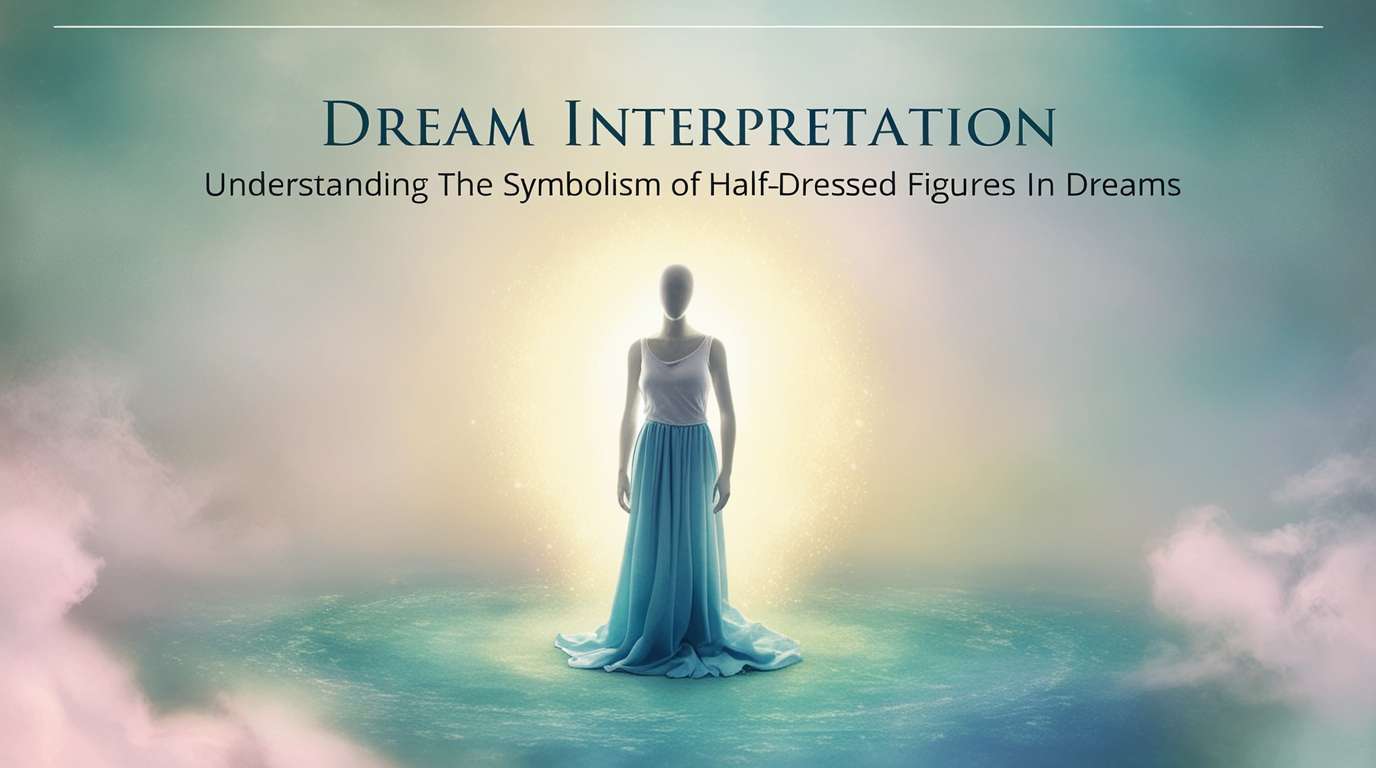
A common dream that many people experience is dreaming of someone else being half dressed. This dream can often leave a person feeling confused or unsettled upon waking. In the realm of dream interpretation, this type of dream holds various meanings and symbolism. Understanding what it means when you dream of someone else being half dressed can provide insight into your subconscious thoughts and emotions.
Table of Contents
What does it mean when you dream of someone else being half dressed?
Dreaming of someone else being half dressed can symbolize vulnerability and feelings of exposure. It may suggest that there are hidden aspects of the person’s character or emotions that are being revealed. This dream could also indicate a lack of readiness or confidence in a certain situation. Seeing someone half dressed in a dream may reflect a sense of embarrassment or discomfort in revealing one’s true self.
On the other hand, dreaming of someone else being half dressed could also represent intimacy and connection. It might signify a desire for a deeper emotional bond with that person or a need for more open communication. This dream could point towards the need for honesty and authenticity in relationships. Overall, dreaming of someone else being half dressed is a symbol of vulnerability, intimacy, and self-expression.

What are the spiritual implications of dreaming of someone else being half dressed?
In a spiritual context, dreaming of someone else being half dressed can have deeper meanings. It may symbolize the stripping away of societal masks and false pretenses to reveal one’s true self. This dream could be a sign of spiritual awakening and a call to authenticity. It may also signal a need for vulnerability and openness in spiritual relationships and connections.
Furthermore, this dream can represent the concept of self-acceptance and self-love. It may suggest that the dreamer needs to embrace all aspects of themselves, including their vulnerabilities and insecurities. Dreaming of someone else being half dressed in a spiritual context could be a reminder to practice compassion and understanding towards oneself and others.
How can dreams of someone else being half dressed be interpreted in relation to personal relationships?
When it comes to personal relationships, dreaming of someone else being half dressed can indicate a need for honesty and transparency. It may suggest that there are hidden truths or emotions within the relationship that need to be addressed. This dream could signify a desire for deeper emotional intimacy and connection with the other person.
On the flip side, dreaming of someone else being half dressed may highlight feelings of vulnerability or insecurity within the relationship. It could reveal a fear of being exposed or judged by the other person. This dream might serve as a reminder to communicate openly and authentically in relationships in order to foster trust and understanding.

What psychological factors play a role in dreams of someone else being half dressed?
Psychologically, dreaming of someone else being half dressed can uncover hidden feelings of inadequacy or insecurity. This dream may stem from a fear of being judged or not measuring up to societal standards. It could reveal deep-seated emotions of shame or embarrassment that need to be addressed.
This dream may also indicate a need for self-acceptance and self-expression. It could be a reflection of inner conflicts or struggles with identity and self-worth. Understanding the psychological factors at play in dreams of someone else being half dressed can help the dreamer uncover underlying issues and work towards personal growth and healing.
How can dreams of someone else being half dressed impact one’s waking life?
Dreams of someone else being half dressed can have a significant impact on one’s waking life. It may bring to light hidden emotions or insecurities that the dreamer was not consciously aware of. This dream could serve as a catalyst for personal growth and introspection.
Furthermore, dreams of someone else being half dressed can influence the way a person perceives themselves and others in their waking life. It may prompt the dreamer to pay closer attention to their relationships and communication patterns. This dream could also inspire the individual to be more open and authentic in their interactions with others.

Conclusion
In conclusion, dreaming of someone else being half dressed carries deep symbolism and meaning. This dream can represent vulnerability, intimacy, and the need for self-expression. It may reflect hidden emotions, insecurities, or desires within the dreamer’s subconscious mind. Understanding the implications of this dream can provide insight into personal relationships, spiritual growth, and psychological well-being.
What Does Finding $20 Mean Spiritually?
FAQs
1. Can dreams of someone else being half dressed be interpreted in a different way?
Yes, dreams of someone else being half dressed can have various interpretations depending on the individual’s personal experiences and emotions. It is important to consider the context of the dream and how it resonates with the dreamer’s waking life.
2. Do recurring dreams of someone else being half dressed hold a deeper meaning?
Recurring dreams of someone else being half dressed may indicate a persistent emotional issue or unresolved conflict that the dreamer needs to address. It could be a sign that certain feelings or insecurities are being repressed and need to be acknowledged.
3. Are dreams of someone else being half dressed common?
Dreams of someone else being half dressed are relatively common and can occur for a variety of reasons. They often reflect the dreamer’s inner thoughts, emotions, and desires that are seeking expression.
4. How can I analyze my dreams of someone else being half dressed?
To analyze dreams of someone else being half dressed, it is helpful to keep a dream journal and record the details of the dream. Reflect on the emotions and symbolism present in the dream, and consider how they relate to your waking life and personal experiences.
5. Should dreams of someone else being half dressed be taken literally?
Dreams of someone else being half dressed should not be taken literally, as they are symbolic representations of the dreamer’s subconscious thoughts and emotions. It is important to explore the deeper meaning and significance of the dream rather than interpreting it at face value.
-

 Spirituality1 year ago
Spirituality1 year agoWhat does a three-legged dog symbolize spiritually?
-

 Spirituality1 year ago
Spirituality1 year agoWhat is the spiritual significance of limes?
-

 Spirituality1 year ago
Spirituality1 year agoWhat is the Spiritual Significance of the Sun and Moon?
-

 Spirituality1 year ago
Spirituality1 year agoWhat Does a Paper Cut Mean Spiritually?
-

 Spirituality1 year ago
Spirituality1 year agoWhat is the spiritual significance of white eyes?
-
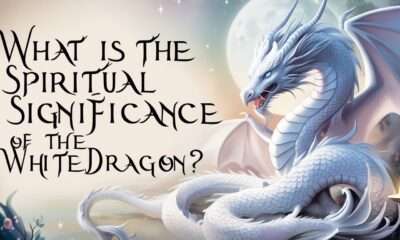
 Symbolism1 year ago
Symbolism1 year agoWhat is the spiritual significance of the white dragon?
-

 Dream Meanings1 year ago
Dream Meanings1 year agoHave You Ever Wondered About the Spiritual Significance of Finding a Lost Item?
-

 Symbolism1 year ago
Symbolism1 year agoWhat Does a Green Moon Symbolize in Spirituality?









